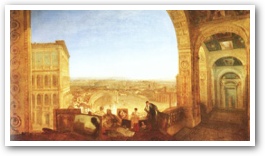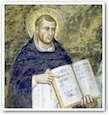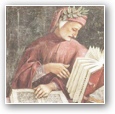What the Church has given the world
- FATHER ANDREW PINSENT AND FATHER MARCUS HOLDEN
Without the Roman Catholic Church, there would be no western civilisation.
Introduction
 |
At a recent debate, broadcast worldwide by the BBC, over 87 per cent of the audience rejected the notion that the Catholic Church is a force for good in the world. Although the defenders of the Church were confronted by two masters of rhetoric, there is little doubt that the vote reflected a shift in attitudes towards Christianity in general and the Catholic faith in particular. To put this shift in blunt terms, whereas we were regarded recently as nice but naïve, today we are increasingly regarded as evil. As a result, teaching the faith and defending Christian ethics has become much more difficult.
To address this challenge at its root, I believe it is vital that we remind ourselves of the extent to which the Catholic faith is a force for good in the world. Jesus said: "You will know them by their fruits," and even some outside the Church appreciate her fruitfulness. In 2007, for example, an atheist businessman, Robert Wilson, gave $22.5 million (£13.5 million) to Catholic education in New York, arguing that, "without the Roman Catholic Church, there would be no western civilisation."
Inspired by Wilson's insight, I have been working recently with Fr Marcus Holden, parish priest of Ramsgate and a tutor at Maryvale, to collate the extraordinary contributions of Catholic culture and Catholic minds. The following sections provide some samples of this work, which should be invaluable to anyone who is faced with the question: "What has the Church ever done for us?"
For a more complete account of the fruitfulness of the Catholic faith in these and many other fields, see Lumen: The Catholic Gift to Civilisation, published January 2011 by the Catholic Truth Society.
1. Light and the cosmos
 |
Fr Georges Lemaître with Albert Einstein
|
The Opus Maius (1267) of the Franciscan Roger Bacon (d 1292), written at the request of Pope Clement IV, largely initiated the tradition of optics in the Latin world. The first spectacles were invented in Italy around 1300, an application of lenses that developed later into telescopes and microscopes.
While many people think of Galileo (d 1642) being persecuted, they tend to forget the peculiar circumstances of these events, or the fact that he died in his bed and his daughter became a nun.
The Gregorian Calendar (1582), now used worldwide, is a fruit of work by Catholic astronomers, as is the development of astrophysics by the spectroscopy of Fr Angelo Secchi (d 1878).
Most remarkably, the most important theory of modern cosmology, the Big Bang, was invented by a Catholic priest, Fr Georges Lemaître (d 1966), a historical fact that is almost never mentioned by the BBC or in popular science books.
2. Earth and nature
 |
Dondi's Astrarium
|
Catholic civilisation has made a remarkable contribution to the scientific investigation and mapping of the earth, producing great explorers such as Marco Polo (d 1324), Prince Henry the Navigator (d 1460), Bartolomeu Dias (d 1500), Christopher Columbus (d 1506) and Ferdinand Magellan
(d 1521). Far from believing that the world was flat (a black legend invented in the 19th century), the Catholic world produced the first modern scientific map: Diogo Ribeiro's Padrón Real (1527). Fr Nicolas Steno (d 1686) was the founder of stratigraphy, the interpretation of rock strata which is one of the principles of geology.
Jean-Baptiste Lamarck (d 1829), a French Catholic, developed the first theory of evolution, including the notion of the transmutation of species and a genealogical tree. The Augustinian monk Gregor Mendel (d 1884) founded the science of genetics based on the meticulous study of the inherited characteristics of some 29,000 pea plants.
3. Philosophy and theology
 |
St Thomas Aquinas
|
Catholicism regards philosophy as intrinsically good and was largely responsible for founding theology, the application of reason to what has been revealed supernaturally. Great Catholic philosophers include St Augustine (d 430), St Thomas Aquinas (d 1274), St Anselm (d 1109), Blessed Duns Scotus (d 1308), Suárez (d 1617) and Blaise Pascal (d 1662). Recent figures include St Edith Stein (d 1942), Elizabeth Anscombe (d 2001) and Alasdair MacIntyre. On the basis that God is a God of reason and love, Catholics have defended the irreducibility of the human person to matter, the principle that created beings can be genuine causes of their own actions, free will, the role of the virtues in happiness, objective good and evil, natural law and the principle of non-contradiction. These principles have had an incalculable influence on intellectual life and culture.
4. Education and the university system
 |
Oxford
|
Perhaps the greatest single contribution to education to emerge from Catholic civilisation was the development of the university system. Early Catholic universities include Bologna (1088); Paris (c 1150); Oxford (1167); Salerno (1173); Vicenza (1204); Cambridge (1209); Salamanca (1218-1219); Padua (1222); Naples (1224) and Vercelli (1228). By the middle of the 15th-century (more than 70 years before the Reformation), there were over 50 universities in Europe.
Many of these universities, such as Oxford, still show signs of their Catholic foundation, such as quadrangles modelled on monastic cloisters, gothic architecture and numerous chapels. Starting from the sixth-century Catholic Europe also developed what were later called grammar schools and, in the 15th century, produced the movable type printing press system, with incalculable benefits for education. Today, it has been estimated that Church schools educate more than 50 million students worldwide.
5. Art and architecture
 |
St. Peter's
|
Faith in the Incarnation, the Word made Flesh and the Sacrifice of the Mass have been the founding principles of extraordinary Catholic contributions to art and architecture. These contributions include: the great basilicas of ancient Rome; the work of Giotto (d 1337), who initiated a realism in painting the Franciscan Stations of the Cross, which helped to inspire three-dimensional art and drama; the invention of one-point linear perspective by Brunelleschi (d 1446) and the great works of the High Renaissance. The latter include the works of Blessed Fra Angelico (d 1455), today the patron saint of art, and the unrivalled work of Leonardo da Vinci (d 1519), Raphael (d 1520), Caravaggio (d 1610), Michelangelo (d 1564) and Bernini (d 1680). Many of the works of these artists, such as the Sistine Chapel ceiling, are considered among the greatest works of art of all time. Catholic civilisation also founded entire genres, such as Byzantine, Romanesque, Gothic, High Renaissance and Baroque architecture. The Cristo Redentor statue in Brazil and the Sagrada Familia basilica in Barcelona show that the faith continues to be an inspiration for highly original art and architecture.
6. Law and jurisprudence
 |
Gratian's Decretals
|
The reforms of Pope Gregory VII (d 1085) gave impetus to forming the laws of the Church and states of Europe. The subsequent application of philosophy to law, together with the great works of monks like the 12th-century Gratian, produced the first complete, systematic bodies of law, in which all parts are viewed as interacting to form a whole. This revolution also led to the founding of law schools, starting in Bologna (1088), from which the legal profession emerged, and concepts such as "corporate personality", the legal basis of a wide range of bodies today such as universities, corporations and trust funds. Legal principles such as "good faith", reciprocity of rights, equality before the law, international law, trial by jury, habeas corpus and the obligation to prove an offence beyond a reasonable doubt are all fruits of Catholic civilisation and jurisprudence.
7. Language
 |
Dante Alighieri
|
The centrality of Greek and Latin to Catholicism has greatly facilitated popular literacy, since true alphabets are far easier to learn than the symbols of logographic languages, such as Chinese. Spread by Catholic missions and exploration, the Latin alphabet is now the most widely used alphabetic writing system in the world. Catholics also developed the Armenian, Georgian and Cyrillic alphabets and standard scripts, such as Carolingian minuscule from the ninth to 12th centuries, and Gothic miniscule (from the 12th). Catholicism also provided the cultural framework for the Divina Commedia (Divine Comedy), the Cantar de Mio Cid ("The Song of my Lord") and La Chanson de Roland (The Song of Roland), vernacular works that greatly influenced the development of Italian, Spanish and French respectively. The Catholic Hymn of Cædmon in the seventh century is arguably the oldest extant text of Old English. Valentin Haüy (d 1822), brother of the Abbé Haüy (the priest who invented crystallography), founded the first school for the blind. The most famous student of this school, Louis Braille (d 1852), developed the worldwide system of writing for the blind that today bears his name.
8. Music
 |
Catholic civilisation virtually invented the western musical tradition, drawing on Jewish antecedents in early liturgical music. Monophonic Gregorian chant developed from the sixth century. Methods for recording chant led to the invention of musical notion (staff notation), of incalculable benefit for the recording of music, and the ut-re-mi ("do-re-mi") mnemonic device of Guido of Arezzo (d 1003). From the 10th century cathedral schools developed polyphonic music, extended later to as many as 40 voices (Tallis, Spem in Alium) and even 60 voices (Striggio, Missa Sopra Ecco).
Musical genres that largely or wholly originated with Catholic civilisation include the hymn, the oratorio and the opera. Haydn (d 1809), a devout Catholic, strongly shaped the development of the symphony and string quartet. Church patronage and liturgical forms shaped many works by Monteverdi (d 1643), Vivaldi (d 1741), Mozart (d 1791) and Beethoven (d 1827). The great Symphony No 8 of Mahler (d 1911) takes as its principal theme the ancient hymn of Pentecost, Veni creator spiritus.
9. The status of women
 |
Maria Agnesi
|
Contrary to popular prejudice, extraordinary and influential women have been one of the hallmarks of Catholic civilisation. The faith has honoured many women saints, including recent Doctors of the Church, and nurtured great nuns, such as St Hilda (d 680) (after whom St Hilda's College, Oxford, is named) and Blessed Hildegard von Bingen (d 1179), abbess and polymath. Pioneering Catholic women in political life include Empress Matilda (d 1167), Eleanor of Aquitaine (d 1204) and the first Queen of England, Mary Tudor (d 1558).
Catholic civilisation also produced many of the first women scientists and professors: Trotula of Salerno in the 11th century, Dorotea Bucca (d 1436), who held a chair in medicine at the University of Bologna, Elena Lucrezia Piscopia (d 1684), the first woman to receive a Doctor of Philosophy degree (1678) and Maria Agnesi (d 1799), the first woman to become professor of mathematics, who was appointed by Pope Benedict XIV as early as 1750.
 This is Meaghen Gonzalez, Editor of CERC. I hope you appreciated this piece. We curate these articles especially for believers like you.
This is Meaghen Gonzalez, Editor of CERC. I hope you appreciated this piece. We curate these articles especially for believers like you.
Please show your appreciation by making a $3 donation. CERC is entirely reader supported.

Acknowledgement
Father Andrew Pinsent and Father Marcus Holden. "What the Church has given the world". Catholic Herald, (May 6, 2011).
Excerpted from the book Lumen: The Catholic Gift to Civilisation by the authors.
Reprinted with permission of the authors, Father Andrew Pinsent and Father Marcus Holden.
The Author
Father Andrew Pinsent is Research Director of the Ian Ramsey Centre for Science and Religion at the University of Oxford, a member of the Faculty of Theology and a priest of the Diocese of Arundel and Brighton. He was formerly a particle physicist at CERN, is a member of the United Kingdom Institute of Physics and is a course tutor for the Maryvale Institute in Birmingham. He has a doctorate in physics from Oxford, a doctorate in philosophy from St Louis and a degree in theology from the Pontifical Gregorian University in Rome. He is a co-author of the Evangelium catechetical course and author of The Second Person Perspective in Aquinas's Ethics: Virtues and Gifts, due to be published by Routledge in 2012.
Father Marcus Holden is parish priest of Ramsgate and Minster, Southwark, the parish where St Augustine of Canterbury landed in England in 597. He is also a tutor at the Maryvale Institute in Birmingham and has recently contributed to writing the first MA degree in the United Kingdom in Catholic Apologetics.
Copyright © 2011 Father Andrew Pinsent and Father Marcus Holden



